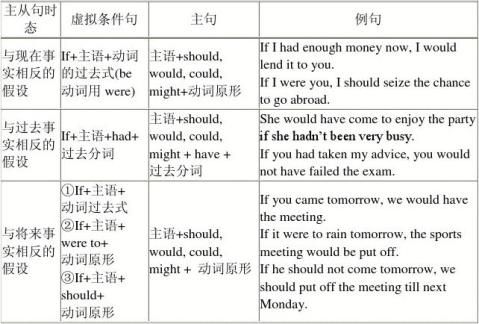虚拟语气用法小结
一、虚拟语气在条件从句中的用法
条件句有两类,一类是真实条件句,一类是虚拟条件句。如果假设的情况是有可能发生的,就是真实条件何。在这种真实条件句中的谓语用陈述语气。如: If it doesn’t rain tomorrow, we will go to the park.
如果假设的情况是过去或现在都不存在的,或将来不大可能发生的,则是虚拟条件句。如: If he had seen you yesterday, he would have asked you about it. 如果他昨天见到你,他会问你这件事的。(事实上他昨天没见到你,因此也未能问你这件事。)
1. 在含有虚拟条件句的复合句中,主句和从句的谓语都要用虚拟语气。虚拟条

2. 错综时间条件句:有时条件从句中的动作和主句中的动作发生的时间不一致(表示错综时间的虚拟语气),这时动词的形式要根据它所表示的时间加以调整。 If you had listened to the doctor, you would be all right now. 如果你当初听了医生的话,身体现在就好了。(从句动作指过去,主句动作指现在)
3. 省略连词if (倒装)。在书面语中,如果虚拟条件从句中有were,had 或 should,可以把if省略,把这几个词放到主语之前,构成主谓倒装。 Should he come (If he should come), tell him to ring me up.
Were I you (If I were you), I would not do it.
Were I to meet him tomorrow (= if I were to met him tomorrow), I should ask him about it. 要是我明天见到他,我就会问他这件事的。
Had I had the money last year (= if I had had the money last year), i would have bought the house. 如果我去年有了这笔钱,我就买那所房子了。
Should there be any trouble with the boiler, the automatic controlling unit would cut off the fuel oil supply. 假如锅炉出问题的话,自控装置会自动切断燃油的供给。
4. 含蓄条件句:句中没有明显的虚拟条件句,而是利用某他手段或方式来暗示存在虚拟条件。其虚拟的结构形式通过主句来表现。常用来表示含蓄虚拟条件的方式有:
(1)介词或介词短语(代替状语从句):but for(要不是…),without(假若没有…),with(假若有…)
With your help, I could have finished the work ahead of time. 如果有你的帮助的话,我本可以提前完成这项工作。
Without air and water, there would be no living things on the earth. 如果没有空气和水,地球上就不会存在生物。
But for the rain, we should have had a pleasant journey. 如果不是因为下雨,旅途会很愉快。
What would you do with a million dollars? 如果有了一百万美元,你会做什么?
(2)用or,otherwise(否则),等类似转折词
He telephoned to inform me of your birthday, or I would have known nothing about it.
I was ill that day. Otherwise, I would have taken part in the sports meeting.
(3)根据上下文语境来表示某种假设情况
Five minutes earlier and you could have met her at the station. 早来五分钟的话,你就能在车站见到他了。
You could have done better,but you didn’t try your best.
5. 省去条件从句或主句:表示虚拟语气的主句或从句有时可以省略,但其含义仍可以推知。
(1)省去条件从句。如: You could have washed your clothes yourself. 你本可以自已洗衣服的。省去了 “If you had wanted to”)(事实是:你自己没洗衣服,因为你不想洗。)
(2)省去主句(常用以表示愿望)。如:
If my grandmother were with me! 如果我的祖母与我在一起多好啊!(事实是:祖母已不在世。)
If only she had not left! 如果她没走就好了!(事实是:她已经走了。)
二、(Should) + 动词原形类
1. 在suggest,demand,order,propose,insist,command,request,desire, recommend等动词后的宾语从句中,谓语动词用“should + 动词原形”,表示建议、要求、命令等。如: I demand that he (should) answer me immediately.
注意:当suggest表示暗示、表明时,不用虚拟语气,用陈述语气。如: The smile on her face suggested that she was satisfied with our work.
当insist表示“坚持认为,坚持说”之意时, 不用虚拟语气,用陈述语气. 表示“坚持要求,坚持主张”用虚拟语气。如:
The man insisted that he had never stolen the money.
我们可以用“一二三四”法巧记这些动词:“一、二、三、四”法,即一个坚持(insist),两个命令(order,command),三个建议(suggest, propose, advise), 四个要求(demand, require, request, ask)。
2. advice, idea, order, plan, demand, proposal, suggestion, request等名词之后的表语从句和同位语从句中.如:
My suggestion is that we (should) hold a meeting this evening.
My proposal is that we(should)set a deadline for handing in the plan.
The general sent the order that the battle(should) be held on until the complete failure of the enemy.
3. 在It is / was suggested (desired, ordered, demanded, required, requested, proposed, etc.) that…
It’s requested that we (should) keep the stability of the society for the people’s peaceful life.
4. 虚拟语气在主语从句中的用法:在 “It is important (strange,natural,necessary) that…” 这类句型里,that所引导的主语从句中的谓语动词常用
“should十动词原形”结构,表示某事是 “重要、奇怪、自然、必要” 等意义。如: It is important that every member (should) inform himself of these rules. 重要的是每个成员知道这些规则。
It is necessary that the badly wounded man(should) be treated immediately. It is (was) important (necessary, natural, strange, etc.) that…
It is (was) a pity (a shame, no wonder, etc.) that …
Should在此类句型中可理解为表示“应该,必须”或“惊讶、遗憾,不以为然”等语气。此类的形容词或名词三种:
①形容某件应该做的事是“必需的”、“重要的”、“适当的”、“自然的”、“紧迫的”等。如:important,necessary,unnecessary,strange,natural,possible,impossible,fortunate,advisable,desirable,essential。
②形容某件居然发生的事令人“惊讶的”“失望的”“可怕的”“好笑的”等。如:surprising,amazing,pleasing,dreadful,funny
③表明某事是一种遗憾。如:a pity,a shame,no wander
It’s strange that he (should) have acted toward his parents like that.(竟然会) It’s surprising/amazing/pleasing/that she (should) win over her mother.(居然会) It’s strange that he (should) leave without telling us. (竟然会)
It’s natural that she (should) make such a mistake.(不以为然的语气,“会”) It’s a pity/a shame/no wonder that our team (should) lose the game.(遗憾或不以为然的语气,竟“会”)
三、虚拟语气的其他用法
1. wish的用法
与现在事实相反, 用were或动词的一般过去式;与过去事实相反, 用had+过去分词;表示将来没有把握或不太可能实现的愿望,用would/could/might+动词原形,后的从句不能用should.如:
I wish she were here. I wish you would go with us tomorrow. I wish she had taken my advice.
2. It is (high) time that 后面的从句谓语动词要用过去式或用should加动词原形,但should不可省略。
It is time that the children went / should go to bed.
3. 用在would rather, had rather后的宾从中谓语动词应用过去时或过去完成时。
I would rather you were not here. I’d rather you had been present.
4. 在带有even if / even though引导的让步状语从句的主从复合句中,主句和从句都用虚拟语气,动词形式与含有非真实条件句的虚拟语气相同。如:
Even if he had been ill, he would have gone to his office. 即使生了病,他俩去办公室。
5. 由as if或as though引导的状语从句表示比较或方式时。从句谓语形式为动词的过去式(be用were)或 “had十过去分词”。如:
He treated me as if I were a stranger.
She talked about the film as if she had really seen it.
注:如果表示的事情可能会发生,那么方式状语从句中的谓语动词可用陈述语气。
6. 在in order that或so that引导的目的状语从句中,谓语动词多用 “could或might(有时也用should)+ 动词原形”。如:
Mr green spoke slowly so that his students could (might) hear clearly.
7. 用在If only句型中,意思是“要是…就好了”。如:
Look at the terrible situation I am in! If only I had followed your advice.
only if表示“只有” I wake up only if the alarm clock rings.只有闹钟响了我才会醒。
8. 在含有if it were not for 或if it had not been for 条件句的虚拟语气中. 如: If it were not for the rain, the crops would die.
If it had not been for your help, we could not have finished the work ahead of time.
9. in case,for fear that引导的状语从句中,表示“唯恐,以免”,谓语动词用should+动词原形表示虚拟语气。
She took the raincoat with her in case she should be caught in rain.
The student is working hard for fear that he should fail to pass the exam.
10. intend,hope,want,plan,mean等表示“希望、想法、意图”,常用过去完成时态或不定式的完成式表示与过去事实相反的虚拟。
I had meant to go to the party,but I had to work extra hours to prepare a speech. I intended to have helped you,but I was very busy at the time.
第二篇:虚拟语气的用法及专项练习题
虚拟语气的用法及专项练习题
虚拟语气表示一种假设的情况,或一种主观的愿望,即动词所表示的动作或状态并非事实,或不可能实现。英语虚拟语气的形式有下列几种:
一、与现在事实相反

Ifhadthetime,JohnwouldmakeatriptoChinatoseetheGreatWall.
IfIwereyou,Iwouldgiveupdrinkingimmediately.
二.与将来事实相反


Ifyoushouldlose,whatwouldyoudo?
IfIweretoseehertomorrow,Iwouldtellherthetruth.
Ifyouwenttherenexttime,youwouldseewhatImean.
三、与过去事实相反

IfI’ddnownthatitwasgoingtorain,Iwouldneverhavegoneforawalkinthecountry.
四、虚拟语气的几种特殊用法
省掉if的条件从句结构:
Had you asked me, I would have told you.(=If you had asked me,…)
2.有时虚拟条件不用条件从句而用不定式、分词、介词、名词、连接词或定语从句来表示,如:

A true friend would not do such a thing.
(=If he were a true friend, he...)
(=If there were no water,…)
(=If you hadn’ t helped me,…)
3.有时条件从句中的动作和结果从句中的动作发生的时间不一致,如:
If he had followed the doctor’s advice, he would be quite all right now. If I were you ,I would have gone home.
五、虚拟语气的其他用法
1、Suggest,advise等动词之后宾语从句须用虚拟语气,其句子结构如下:
注意:在此结构中that不可省略;should省不省均可。
He suggested that they(should) stop smoking.
上述动词的名词形式出现时,that引导的从句仍用虚拟语气。
He made are quest that they (should)stop smoking.
如果that引导的从句所表达的内容是事实,也可用陈述语气。
Heinsiststhatheisright.
2、Itis(was)+necessary,apity等+that引导的从句须用虚拟语气,其句子结构如下:

Itisimportantthatyou(should)followthedoctor’sorders.
Itisrightthatyoushouldhavedoneyourhomework.
3、wish的用法

IwishIwereapopsinger.(=IamsorryIamnotapopsinger..)
IwishIhadneverstoppedteaching.(=IamsorryIstoppedteaching.)
Iwishthey’dletusgetsomesleep.
注意:wish与hope接宾语从句的区别在于:hope表示一般可以实现的希望,宾语从句用陈述语气。wish表示很难或不大可能实现的希望,宾语从句用虚拟语气。试比较:
(1)Wehopetheywillcome,(Wedon’tknowiftheycancome.)
(2)Wewishtheycouldcome,(Weknowtheyarenotcoming.)
4、asif,asthough,would(had)rather(that)引导的从句须用虚拟语气,如: Heactsasifnothinghadhappened.
Iwouldratheryoudidn’ttellhim.
5、It’s(high)timethat…+动词过去式或should+动词原形,如:
It’stime(that)youhadahaircut.
It’shightime(that)wetooksomeaction.
虚拟语气专项练习题
(1).IfIyou,Iwouldgobyplane.Flyingismuchfaster.
A.beB.wasC.wereD.am
(2).IdonotthinkthosepeoplearereallyEnglish.Iftheywere,theyspeak wishFrenchaccents.
A.don'tB.willnotC.mustn'tD.wouldn't
(3)today,wouldwebeabletogettherebyTuesday?
A.WereweleavingB.Ifweleave
C.WouldweleaveD.Werewetoleave
(4).IfJonetomorrow,whatwouldyoudo?
A.werenottocomeB.willnotcome
C.wouldnotcomeD.hadnotcome
(5).“Shedidn'taskme,soIdidn'thelpher?”
“Youmeantosay,youwould'vehelpedher?”
A.ifsheaskedyouB.ifsheweretoaskyou
C.hadsheaskedyouC.wereshetoaskyou
(6).Theytooktheinjuredstraighttothehospital.Otherwisesomeofthem.
A.mighthavediedB.mightdieC.woulddieD.coulddie
(7).Iftheyhadknownhim,tohim?
A.wouldtheyhavetalkedB.wouldtheytalk
C.hadtheytalkedD.theywouldtalk
(8).IfIlivedinthecity,Itravealincrowededbuses,butItoseelotsoffilms.
A.shallhaveto/shallbeableB.shallhaveto/amable
C.wouldhaveto/wereableD.wouldhaveto/wouldbeable
(9).Iwouldhavegonetotheconcert,ifItime.
A.hadhadB.havehadC.hadD.wouldhavehad
(10).Iknowit,Iwouldhavetoldyou.
A.HaveB.IfC.HadD.Having
(11).yourhelp,Iwouldnothavesucceeded.
A.BecauseB.BecauseofC.ButD.Butfor
(12).“WhatdidMrSmithsayabouthiscareer?”
“Onlythatifheamillionaire,hewouldhavefewerworries.”
A.didnotbecomeB.hadnotbecome
C.doesnotbecomeD.hasnotbecome
(13).“Whydidn'tyouhelphim?”
“IwouldhaveIdidn'thavethemoney.”
A.stillB.butC.otherwiseD.or
(14).“WhoshouldgotoseeLiYing?Heisilltoday.”
“IsuggestWangHong.”
A.goesB.wouldgoC.goD.went
(15).Thehousemasterwasstrict.Herequestedthatwetelevisiononweek nights.
A.notwatchB.mustnottowatch
C.notbewatchingD.havenotwatch
(16).Ican'tspeakJapanese,butIdowishI.
A.canB.couldC.hadD.speak
(17).“Areyouenjoyingyourstayhere?’
“Yes,verymuch.IwishIhavetoleavesosoon.”
A.won'tB.don'tC.mustn'tD.didn't
(18).“Whatwillyoudoduringthesummerholidays?”
“Idon'tknow,butit'sabouttimeonsomething.”
A.I'mdecidingB.I'lldecideC.IdecidedD.I'ddecided
(19).I'dratheryouanythingaboutitforthetimebeing.
A.sayB.didn'tsayC.don'tsayD.notsay
(20).“Whydoyouhavetobethereatsix?”
“Theteacherdemandsthateveryoneinhisseatatsix.”
A.wouldbeB.canbeC.beD.willbe
(21).Hemakesanoteoftheassignmentlestheit.
A.forgetsB.forgetC.willforgetD.willnotforget
(22).“howdoesthelibrarianact?”
“Heactsasifheawalkingdictionary.”
A.wereB.beC.isD.hasbeen
(23).Thereisalawthatdrunkendriversseverelypunished.
A.wereB.areC.beD.willbe
(24).IwishyouinterruptwhenI'mtalkingonthephone.
A.willnotB.wouldnotC.donotD.didnot
(25).Henrytalkstohisdogasifithim.
A.understandsB.understoodC.understandD.wouldunderstand
(26).Jefflookedasifheaghost.
A.sawB.hasseenC.hadseenD.wouldsee
(27).Givehermybestregards,.
A.shouldyouseehertodayB.ifyousawhertoday
C.ifyouwouldseehertodayD.shouldyouhaveseenhertoday
(28).Therewasasuggestionbytheteachersthatthemeetingpostponedforaweek.
A.hadbeenB.wouldbeC.wasD.shouldbe
(29).ItishighlydesirablethateveryefforttoreducepollutioninBeijing.
A.wasmadeB.bemadeC.willbemadeD.wouldbemade
(30).Themanagerwouldratherthathiswifeworkinthesameofficeashedose.
A.doesnotB.didnotC.wouldnotD.willnot
(31).Theteacherinsistedthatweallbackbytwoo'clock.
A.beB.tobeC.wouldbeD.shallbe
(32).Ididn'tgotothefootballmatch,butIdowishIthere.
A.wentB.wasC.wereD.hadbeen
(33).Itishightimewedrugtrafficking.(贩毒)
A.didawaywithB.doawaywith
C.didawayD.shoulddoawaywith
虚拟语气专项练习题参考答案
(1)C(2)D(3)D(4)A(5)C(6)A(7)A(8)D(9)A(10)C
(11)D(12)B(13)B(14)C(15)A(16)B(17)D(18)C(19)B
(20)C(21)B(22)A(23)C(24)B(25)B(26)C(27)A(28)D
(29)B(30)B(31)A(32)D(33)A

